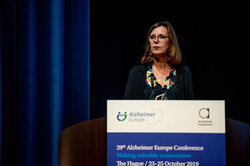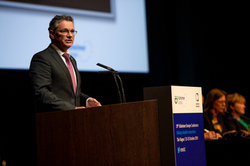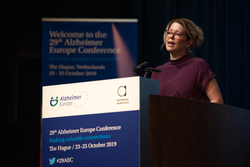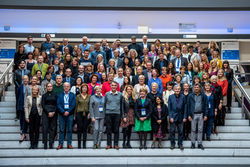 The Hague, 24 October 2019 – The 29th Alzheimer Europe Conference (#29AEC) “Making valuable connections” was formally opened yesterday evening, 23 October 2019. 954 participants from 46 countries are attending the conference, in The Hague, from 23 to 25 October 2019, which involves 287 speakers and 241 poster presentations, sharing research, projects and experiences in an atmosphere of collaboration. The Hague, 24 October 2019 – The 29th Alzheimer Europe Conference (#29AEC) “Making valuable connections” was formally opened yesterday evening, 23 October 2019. 954 participants from 46 countries are attending the conference, in The Hague, from 23 to 25 October 2019, which involves 287 speakers and 241 poster presentations, sharing research, projects and experiences in an atmosphere of collaboration.
Iva Holmerová, Chairperson of Alzheimer Europe, opened the conference, extending a special welcome to the 36 people with dementia who are among the delegates, as well as their supporters. She noted that public awareness of dementia has increased in recent years, and that the number of national dementia strategies is growing, across Europe, as is the number of dementia-friendly initiatives in many countries. She was also pleased to share that policy-makers have begun to acknowledge that, due to the complex nature of dementia, better coordinated research is needed, coupled with increased funding. All of this needs to happen in the modern, fast-paced and sometimes confusing context in which we all live, she commented. As a final point, she highlighted the importance of better awareness of dementia, not only for the sake of people with dementia and their relatives, but for the sake of society as a whole, which must find ways to overcome hurdles and to fill the gaps in its understanding.
Following Iva Holmerová’s opening speech, delegates were also welcomed by Gerjoke Wilmink, Executive Director of Alzheimer Nederland; Myrra Vernooij-Dassen, Chairperson of INTERDEM; Helen Rochford-Brennan, Chairperson of the European Working Group of People with Dementia (EWGPWD); Kavita Parbhudayal, Deputy Mayor of The Hague; and Theo van Uum, Director of Long-term Care at the Dutch Ministry of Health, Welfare and Sport.
 Gerjoke Wilmink referred to Alzheimer Nederland’s 35th anniversary, and drew delegates’ attention to the organisation’s role as one of the co-founders of Alzheimer Europe and as hosts and co-organisers of the 1st Alzheimer Europe Conference, in Friesland. Alzheimer Nederland believes that learning and exchanging knowledge/experiences are of paramount importance in strengthening the dementia movement. “That’s why we think this conference is so important and that’s why we have our own track with innovations and good practice examples”, she said. She also mentioned Alzheimer Nederland’s national “Dementia Event”, organised annually, especially for people with dementia and their carers. This year’s edition was held yesterday, in The Hague, just prior to the opening ceremony of the Alzheimer Europe Conference. Gerjoke Wilmink referred to Alzheimer Nederland’s 35th anniversary, and drew delegates’ attention to the organisation’s role as one of the co-founders of Alzheimer Europe and as hosts and co-organisers of the 1st Alzheimer Europe Conference, in Friesland. Alzheimer Nederland believes that learning and exchanging knowledge/experiences are of paramount importance in strengthening the dementia movement. “That’s why we think this conference is so important and that’s why we have our own track with innovations and good practice examples”, she said. She also mentioned Alzheimer Nederland’s national “Dementia Event”, organised annually, especially for people with dementia and their carers. This year’s edition was held yesterday, in The Hague, just prior to the opening ceremony of the Alzheimer Europe Conference.
Myrra Vernooij-Dassen spoke on behalf of INTERDEM (Early detection and timely INTERvention in DEMentia). She emphasised the importance of taking responsibility to move the field forward, mentioning three ways in which this could be done: Firstly, more individualised interventions need to be developed, based on a better understanding of both the variety of ways in which people may be affected by dementia and of the mechanisms of change underlying effective interventions. These interventions include cognitive, functional and social interventions and can use adapted new technologies. Secondly, models of co-production in dementia research and in implementation of research findings could also be developed. Finally, the next generation of dementia care researchers could be stimulated, educated and mentored.
Helen Rochford-Brennan addressed delegates from her perspective as a person living with dementia. She highlighted the value of the voice of people living with dementia, in particular drawing attention to the benefits of patient and public involvement (PPI). She also stressed that more communication and knowledge-sharing in the research community is vital, to avoid “reinventing the wheel”. Researchers need to branch out beyond their current pool of contacts, to move things forward, she said. “We know Europe is becoming more diverse, but researchers need to seek out those new voices and not take the easy option by asking the same people over and over again.” Helen Rochford-Brennan is also keen to ring the changes in other areas where she feels there is room for improvement. There is a growing preference among her peers for moving away from “dementia friendly” and towards “dementia inclusive” societies and initiatives, for example. Finally, she addressed national policymakers, encouraging them to focus on dementia plans rather than strategies. This would have both economic and practical benefits, she concluded.
 Kavita Parbhudayal, Deputy Mayor of The Hague, responsible for Care, Youth and Public Health took the floor next, extending a warm welcome to delegates in The Hague. Following her, Theo van Uum from the Dutch Ministry of Health, Welfare and Sport assured delegates that dementia, in all of its aspects, is a priority for the Dutch Government. The Government’s mission, he said, is to ensure that people with dementia and their relatives feel included in society; to provide quality dementia support and care; to support scientific research into possible cures and/or methods of prevention, to speed the process up. This mission feeds into the country’s new dementia strategy, which has three pillars: The first, “Dementia and society”, aims to not only create a dementia-friendly society, but also to empower people with dementia to continue to be active and to use their abilities, thus enabling them to continue to be part of society and to have a meaningful life, with dignity. The second pillar, “Dementia and care”, focuses on good quality care and support, using innovation and taking into account labour market challenges. The third and final pillar is, “Dementia and research”, which seeks to intensify dementia research in both national and international collaborations. Kavita Parbhudayal, Deputy Mayor of The Hague, responsible for Care, Youth and Public Health took the floor next, extending a warm welcome to delegates in The Hague. Following her, Theo van Uum from the Dutch Ministry of Health, Welfare and Sport assured delegates that dementia, in all of its aspects, is a priority for the Dutch Government. The Government’s mission, he said, is to ensure that people with dementia and their relatives feel included in society; to provide quality dementia support and care; to support scientific research into possible cures and/or methods of prevention, to speed the process up. This mission feeds into the country’s new dementia strategy, which has three pillars: The first, “Dementia and society”, aims to not only create a dementia-friendly society, but also to empower people with dementia to continue to be active and to use their abilities, thus enabling them to continue to be part of society and to have a meaningful life, with dignity. The second pillar, “Dementia and care”, focuses on good quality care and support, using innovation and taking into account labour market challenges. The third and final pillar is, “Dementia and research”, which seeks to intensify dementia research in both national and international collaborations.
Effectively supporting family carers through the medium of eHealth
 In her keynote presentation on “eHealth as effective support for family carers”, Marjolein de Vugt, Professor of Psychosocial Innovations in dementia at Maastricht University Medical Center+, emphasised the need for a more balanced view of dementia and its impact. While the dominant view on dementia places much emphasis on suffering and loss and while there is no cure for the disease, it does not mean that people with dementia are without hope, or lost. “There can certainly be room for positive experiences and a meaningful life despite the illness”, she said, and eHealth can contribute to this. It enables a more affordable and personalised delivery of care by increasing socio-economic inclusion, patient empowerment, and access to services and information in daily life. In her keynote presentation on “eHealth as effective support for family carers”, Marjolein de Vugt, Professor of Psychosocial Innovations in dementia at Maastricht University Medical Center+, emphasised the need for a more balanced view of dementia and its impact. While the dominant view on dementia places much emphasis on suffering and loss and while there is no cure for the disease, it does not mean that people with dementia are without hope, or lost. “There can certainly be room for positive experiences and a meaningful life despite the illness”, she said, and eHealth can contribute to this. It enables a more affordable and personalised delivery of care by increasing socio-economic inclusion, patient empowerment, and access to services and information in daily life.
Three elements are important to maximise the potential of eHealth interventions to support carers of people with dementia: They need to be delivered at the optimal time; they should match the needs of potential users; and they must be accessible.
In closing, Marjolein de Vugt stressed that the main hindrance to the use of eHealth interventions in daily dementia practice is a lack of research into its implementation. This, coupled with a number of implementation barriers, needs to be overcome in order to move forwards.
Following the keynote lecture, delegates enjoyed the welcome reception in the foyer, accompanied by members of the Odensejazzband - a group of professional jazz musicians from Amsterdam, the majority of whom have memory problems. A small team from Alzheimer Indonesia also regaled guests by performing the “Poco-poco” (also known as “Senam Ceria”), a popular traditional dance from Eastern Indonesia.
Alzheimer Europe holds its 2019 Annual Meeting in The Hague
 Prior to the opening ceremony, a number of ancillary meetings took place. Alzheimer Europe organised its Annual General Meeting with representatives of its national member organisations. 33 out of 35 full member organisations were in attendance or were represented. Prior to the opening ceremony, a number of ancillary meetings took place. Alzheimer Europe organised its Annual General Meeting with representatives of its national member organisations. 33 out of 35 full member organisations were in attendance or were represented.
Alzheimer Europe celebrated its achievements in 2018 and shared its plans for 2020 with meeting participants and observers. Some of the organisation’s main achievements from 2018 were:
- carrying out a mapping exercise of national working groups of people with dementia and providing a report with the results, as well as identifying good practices
- reinstituting the European group of governmental experts on dementia and organising a first meeting of the group, with representation from 17 national ministries, the European Commission, the OECD and the World Health Organization
- publishing the 2018 Dementia in Europe Yearbook with a comparison of 21 national dementia strategies in European countries
- developing a report on intercultural care and support for people with dementia from minority ethnic groups as part of its European Dementia Ethics Network
- publishing the results of a survey of 1,409 carers’ experiences of a diagnosis in the Czech Republic, Finland, Italy, the Netherlands and the United Kingdom (Scotland) in a report and publishing a scientific article in the International Journal of Geriatric Psychiatry thanks to an educational grant from Roche.
The meeting also focused on the recent European Parliament elections and looked at ways to try and ensure dementia is a priority of the next EU Health and Research Programmes.
Policy Officer Owen Miller presented some preliminary findings from the European Dementia Movement survey, carried out this year. He was pleased to share that, based on responses from 55% of member organisations, the network already includes 592 local and regional branches, 3,910 staff members, and that its 2018 expenditure was approximately EUR 220 million.
INTERDEM network celebrates 20 years at its Annual Meeting in The Hague

INTERDEM is a network of researchers interested in psychosocial interventions. It is made up of 217 researchers and academics with different professional disciplines, spread across 23 countries (19 of which are in Europe). The INTERDEM network held its fully booked Annual Meeting on 23 October 2019, prior to #29AEC, with 110 researchers attending. There were two sessions, the first of which was reserved for participants to share news of their ongoing research activities, and gave them the opportunity to give and receive feedback, as well as exploring opportunities for further collaboration. The second session, focused on “New insights in caregiving and community”. Speakers from Germany and The Netherlands addressed caregiving challenges, social health and the role of the community. During the meeting the 20th anniversary of the INTERDEM network was celebrated with the participation of Jean Georges, Executive Director of Alzheimer Europe, which is a key partner of INTERDEM.
Alzheimer Europe would like to extend a warm welcome to all delegates and remind everyone to use the hashtag #29AEC to join/follow the conversation on Twitter.
For further information, contact:
Jean Georges, Executive Director of Alzheimer Europe, 14, rue Dicks, L-1417 Luxembourg, Tel.: +352-29 79 70, Fax: +352-29 79 72, jean.georges@alzheimer-europe.org
Notes to editors:
Alzheimer Europe is the umbrella organisation of national Alzheimer associations and currently has 42 member organisations in 37 European countries. (www.alzheimer-europe.org).
The European Working Group of People with Dementia (EWGPWD) was launched by Alzheimer Europe in 2012. It is composed entirely of people with dementia, nominated by their national Alzheimer associations. They work to ensure that the activities of Alzheimer Europe reflect the priorities and views of people with dementia. The group operates independently and the Chairperson is also on the Board of Alzheimer Europe. (/www.alzheimer-europe.org/Alzheimer-Europe/Who-we-are/European-Working-Group-of-People-with-Dementia)
INTERDEM is a pan-European network of researchers collaborating in research on and dissemination of Early, Timely and Quality Psychosocial Interventions in Dementia aimed at improving the quality of life of people with dementia and their supporters, across Europe (http://interdem.org/). |